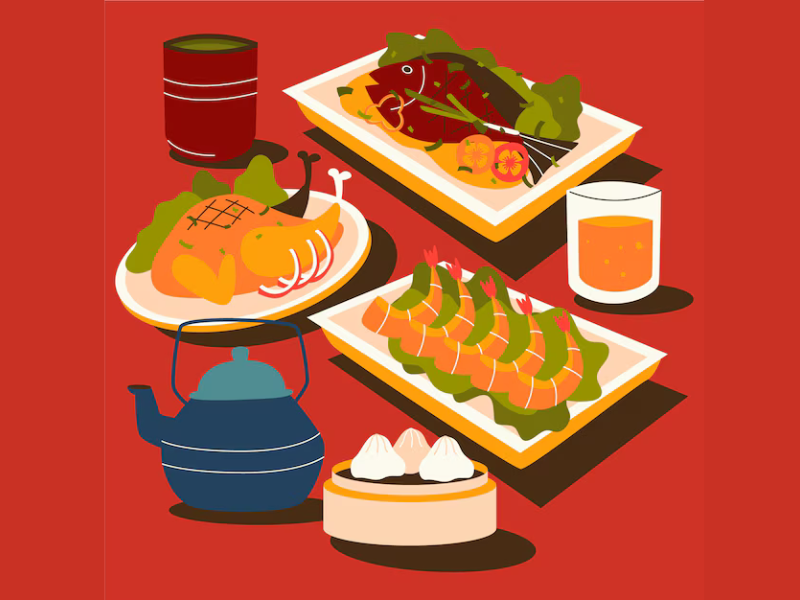Chinese cuisine is known for its delicious flavors, intricate preparation techniques, and rich cultural history. But did you know that Chinese food also has numerous health benefits that can contribute to overall well-being? From promoting digestion to boosting immunity, Chinese cuisine offers a variety of ingredients and cooking methods that can improve your health in more ways than one. In this article, we will explore the many health benefits of Chinese cuisine and why it’s more than just a tasty treat.
1. Rich in Nutrients
Chinese cuisine is characterized by a diverse array of ingredients, including fruits, vegetables, meats, and seafood. These ingredients are packed with essential nutrients such as vitamins, minerals, and antioxidants that are vital for maintaining good health. For example, Chinese dishes often contain leafy greens like bok choy and spinach, which are rich in vitamin K, folate, and calcium. Seafood, a staple in many Chinese dishes, is high in omega-3 fatty acids, which are important for heart health and brain function.
2. Promotes Digestion
Chinese cuisine emphasizes the importance of balance and harmony in food, often incorporating ingredients that aid in digestion. For example, ginger, garlic, and scallions are common ingredients in many Chinese dishes and are known for their digestive properties. Ginger, in particular, has been used in traditional Chinese medicine for centuries to help alleviate digestive issues such as bloating and nausea. Consuming these ingredients regularly can help promote a healthy digestive system and prevent gastrointestinal discomfort.
3. Supports Weight Management
One of the key principles of Chinese cuisine is moderation, which can be beneficial for those looking to manage their weight. Chinese dishes typically contain a balance of carbohydrates, proteins, and fats, as well as plenty of vegetables, which can help you feel full and satisfied without overeating. Additionally, many Chinese cooking methods such as steaming, boiling, and stir-frying use minimal oil and cooking fat, making Chinese cuisine a healthy and low-calorie option for those watching their weight.
4. Regulates Blood Sugar Levels
Another health benefit of Chinese cuisine is its ability to help regulate blood sugar levels. Many Chinese dishes are low in refined sugar and carbohydrates, relying instead on the natural sweetness of fruits and vegetables. Additionally, Chinese cuisine often incorporates ingredients such as bitter melon and fenugreek, which have been shown to help lower blood sugar levels and improve insulin sensitivity. By choosing Chinese dishes that are low in sugar and high in fiber, you can help prevent spikes in blood sugar and reduce your risk of developing diabetes.
5. Boosts Immunity
Chinese cuisine is full of ingredients that can help boost your immune system and protect you from illness. Many Chinese herbs and spices such as ginger, garlic, and turmeric have antibacterial and antiviral properties that can help strengthen your body’s defenses against infections. Additionally, Chinese dishes often include a variety of vegetables and herbs that are high in antioxidants, which can help reduce inflammation and oxidative stress in the body. By eating a diverse range of Chinese dishes that are rich in immune-boosting ingredients, you can support your body’s natural defenses and stay healthy year-round.
6. Improves Heart Health
Heart disease is a leading cause of death worldwide, but the good news is that Chinese cuisine can help improve heart health and reduce your risk of developing cardiovascular problems. Many Chinese dishes are low in saturated fat and cholesterol, and instead focus on lean proteins such as chicken, fish, and tofu. Chinese cooking methods such as steaming, boiling, and stir-frying also help to preserve the nutritional content of ingredients, making Chinese cuisine a heart-healthy option. By incorporating more Chinese dishes into your diet, you can support your heart health and reduce your risk of heart disease.
7. Supports Brain Function
In addition to promoting heart health, Chinese cuisine can also support brain function and cognitive health. Many Chinese herbs and spices such as turmeric, ginseng, and green tea have been shown to improve memory, focus, and cognitive performance. Chinese dishes that contain omega-3 fatty acids, such as fish and flaxseed, can also help protect brain cells and improve communication between neurons. By including these brain-boosting ingredients in your diet, you can support your cognitive health and reduce your risk of age-related cognitive decline.

8. Enhances Mood
Chinese cuisine not only benefits your physical health but also your mental health and well-being. Many Chinese herbs and spices, such as saffron, lavender, and chamomile, have calming and mood-boosting properties that can help reduce stress and anxiety. Chinese dishes that contain complex carbohydrates, such as brown rice and whole grains, can also help stabilize blood sugar levels and improve mood. By incorporating a variety of mood-enhancing ingredients into your diet, you can support your mental health and overall well-being.
9. Promotes Longevity
Chinese cuisine has a long history of being associated with longevity and vitality. Traditional Chinese medicine believes in the concept of yin and yang, which emphasizes the importance of balance and harmony in all aspects of life, including diet. By incorporating yin and yang foods into your diet, such as cooling fruits and warming spices, you can help create a sense of balance in your body and promote overall health and longevity. Chinese dishes that are rich in antioxidants, vitamins, and minerals can also help protect your cells from damage and slow down the aging process.
10. Reduces Inflammation
Chronic inflammation is linked to a variety of health problems, including arthritis, heart disease, and cancer. The good news is that Chinese cuisine can help reduce inflammation in the body and prevent these chronic diseases. Many Chinese herbs and spices, such as turmeric, ginger, and cinnamon, have anti-inflammatory properties that can help reduce swelling and pain in the body. Chinese dishes that contain plenty of fruits, vegetables, and whole grains are also high in antioxidants, which can help combat inflammation and protect your cells from damage.
11. Supports Gut Health
A healthy gut is crucial for overall well-being, as it is responsible for digesting food, absorbing nutrients, and supporting the immune system. Chinese cuisine can help support gut health by incorporating probiotic-rich foods such as fermented vegetables, tofu, and miso. These foods contain beneficial bacteria that can help maintain a healthy balance of gut flora and improve digestion. Chinese dishes that are high in fiber, such as whole grains and legumes, can also support gut health by promoting regular bowel movements and reducing inflammation in the digestive tract.
12. Balances Energy Levels
According to traditional Chinese medicine, the concept of qi, or life force energy, plays a central role in maintaining health and well-being. Chinese cuisine focuses on balancing energy levels in the body through the use of nourishing foods and cooking methods. For example, Chinese dishes that contain warming spices such as ginger and cinnamon can help invigorate the body and improve circulation. Cooling foods such as cucumber and watermelon can help cool the body and reduce inflammation. By incorporating a variety of yin and yang foods into your diet, you can help balance your energy levels and promote overall health.
13. Improves Skin Health
Chinese cuisine can also benefit your skin health by providing essential nutrients and antioxidants that help support collagen production and reduce signs of aging. Many Chinese dishes contain ingredients such as green tea, goji berries, and nuts, which are high in vitamins and minerals that promote healthy skin. Chinese herbs and spices like turmeric, licorice, and ginseng have anti-inflammatory and antioxidant properties that can help reduce acne, redness, and wrinkles. By incorporating these skin-loving ingredients into your diet, you can support your skin health and achieve a radiant complexion.
14. Supports Weight Loss
In addition to promoting digestion and regulating blood sugar levels, Chinese cuisine can also support weight loss by providing nourishing and low-calorie options. Many Chinese dishes are packed with fiber-rich vegetables, lean proteins, and complex carbohydrates that can help you feel full and satisfied without consuming excess calories. Chinese cooking methods such as steaming, boiling, and stir-frying also use minimal oil and cooking fat, making Chinese cuisine a healthy option for those looking to lose weight. By choosing Chinese dishes that are nutrient-dense and low in calories, you can support your weight loss goals and improve your overall health.
15. Conclusion
In conclusion, Chinese cuisine offers a variety of health benefits that go beyond just delicious flavors. From promoting digestion to boosting immunity, Chinese dishes contain an array of ingredients and cooking methods that can improve your health in numerous ways. By incorporating more Chinese dishes into your diet, you can support your overall well-being and enjoy the many health benefits that this rich and diverse cuisine has to offer. So the next time you’re craving Chinese food, remember that it’s more than just a tasty treat – it’s a nourishing and healthy choice for your body and mind.
FAQs about “The Health Benefits of Chinese Cuisine: Why it’s More than Just Delicious”
- What makes “The Health Benefits of Chinese Cuisine: Why it’s More than Just Delicious” a compelling read for health-conscious individuals? This book delves into the nutritional aspects of Chinese cuisine, highlighting its health benefits beyond taste. It provides insights into ingredients, cooking techniques, and cultural practices that contribute to its nutritional value.
- Which health benefits are associated with Chinese cuisine as discussed in this book? “The Health Benefits of Chinese Cuisine” discusses various health benefits associated with Chinese cuisine, such as the use of fresh vegetables, lean proteins, and balanced cooking methods that promote overall well-being, digestion, and longevity.
- Are specific Chinese dishes and ingredients featured in this book for their health benefits? Yes, this book features specific Chinese dishes and ingredients known for their health-promoting properties, such as herbal soups, steamed fish, stir-fried vegetables, and teas like green tea, along with explanations of their nutritional benefits.
- How does this book shed light on the cultural and dietary practices that contribute to the healthfulness of Chinese cuisine? This book sheds light on the cultural and dietary practices inherent in Chinese cuisine, exploring concepts such as balance, harmony, and the holistic approach to food and health that are deeply ingrained in Chinese culinary traditions.
- Can readers expect to gain practical advice for incorporating healthy Chinese cooking techniques into their own meals from this book? Absolutely! “The Health Benefits of Chinese Cuisine” offers practical advice, cooking tips, and recipe ideas for incorporating healthy Chinese cooking techniques into everyday meals, empowering readers to adopt a more nutritious and balanced approach to eating.
Advantages:
- Health Focus: The title “The Health Benefits of Chinese Cuisine: Why it’s More than Just Delicious” emphasizes the health aspect of Chinese cuisine, attracting readers interested in wellness and nutrition.
- Educational Value: By exploring the health benefits of Chinese cuisine, the title offers readers valuable insights into the nutritional properties and potential health effects of Chinese ingredients and cooking methods, enriching their understanding of Chinese culinary traditions.
- Cultural Exploration: The title invites readers to explore the intersection of health and culture in Chinese cuisine, fostering a deeper appreciation for the culinary heritage and traditions of China.
- Gastronomic Insight: Readers can expect to learn about the diverse range of Chinese ingredients and dishes that contribute to a healthy diet, providing them with practical knowledge to incorporate these elements into their own meals.
- Inspiration for Healthy Eating: The title may inspire readers to adopt healthier eating habits by incorporating Chinese ingredients and cooking techniques into their diets, encouraging culinary exploration and experimentation with Chinese gastronomy.
Disadvantages:
- Oversimplified Health Claims: Focusing solely on the health benefits of Chinese cuisine may oversimplify its nutritional value and potential health effects, overlooking other factors such as portion sizes, cooking methods, and overall dietary patterns.
- Cultural Misrepresentation: Without careful analysis and context, the title may inadvertently misrepresent Chinese cuisine as inherently healthy, overlooking the diversity of Chinese dishes and the presence of less healthy options.
- Limited Scope: The title may not cover every aspect of Chinese cuisine’s health benefits in depth, potentially leaving out certain ingredients or health-related practices that could provide a more comprehensive understanding.
- Lack of Nuance: The title may not address the potential side effects or contraindications associated with certain Chinese ingredients or cooking methods, potentially presenting a one-sided view of their health benefits.
- Audience Engagement: While the title appeals to readers interested in health and nutrition, it may not attract those seeking practical cooking tips or recipes, limiting its audience appeal.
















